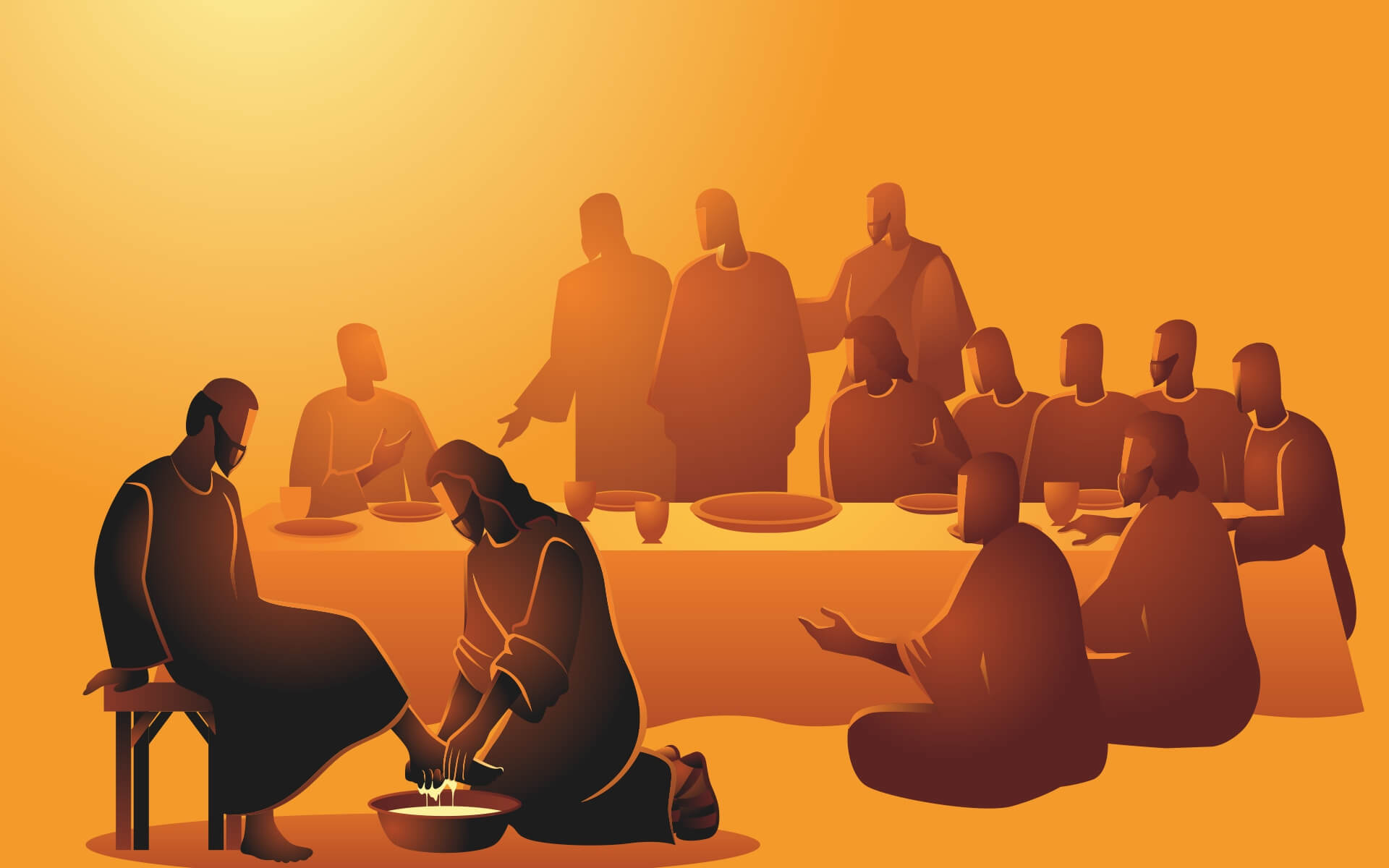Today, 9th of April, 2020, is Maundy Thursday.
Holds an important message for all followers of Jesus.
If you are a member of a so-called mainline church, there may be little that is new for you.
Traditions
However, there are tons of genuine Christians (including some of my friends) who do not celebrate any of these special days (like Easter, Christmas, etc.). They argue that “these festivals are not in the Bible and have pagan roots”. I have no grouse or argument with such believers. God bless you! ???? [However, even if you don’t agree with the tradition of having special days, you may find the teaching of Scripture below helpful.]
The traditions around Holy Week are very ancient and beautifully diverse. These traditions—and tradition is not always bad—are today celebrated by a couple of billion Christians, in all three major branches of Christianity (Roman Catholic, Protestants, and Orthodox).
I think that these traditional celebrations can have great value, if we participate in them meaningfully.
The celebration of 40 days of Lent, beginning Ash Wednesday (this year was on Feb 26) and culminating in the Holy (or Passion) Week, has been around since the fourth century.
Some of our churches celebrate bits and parts (like Palm Sunday, Good Friday and Easter), leaving out certain other days like Ash Wednesday, Maundy Thursday and Holy Saturday.
Ash Wednesday
And while we are at it, let me put in a few words about Ash Wednesday. In the churches that celebrate this tradition, ash is applied to the forehead in a symbolic act. We are familiar with ash as a sign for repentance (“I repent in dust and ashes”) and a reminder of our mortality (“Dust to dust, ashes to ashes”).
While the whole world is battling the deadly novel coronavirus pandemic, it is a sober reminder that we are short-lived mortals (in this life), who must learn to live every day as God’s gift (Matt 6:25-34).
So, the whole season of Lent is to get us in a posture of lifelong repentance, a constant returning to the true and living God, for we are surrounded by the deceptive idols of materialism, pleasure, and fame.
So, whether you participated in a special Ash Wednesday service or not (I did not), we all need to be on a trajectory of genuine repentance.
Coming Back to Maundy Thursday:
Maundy comes from the Middle English term derived from the Latin mandatum (from which we get the English word mandate).
Maundy Thursday refers to the Day of the Commandment.
This is “the new commandment” that Jesus charged his disciples with:
“Love one another. As I have loved you, so you must love one another. By this everyone will know that you are my disciples, if you love one another” (John 13:34-35).
Jesus’s farewell dinner is presented quite differently in the four Gospels. At a significant farewell, important words of instruction and encouragement are bound to be spoken. On this day, Jesus celebrated “the Lord’s Supper” with his anxious disciples.
We have quite different traditions worldwide. Various terms are used—including The Lord’s Table, Communion, Eucharist (= giving thanks), and Mass (= meal). This commemorative meal has become the most significant observance in all (or most) Christian congregations.
While it may appear that eating bread and sipping wine is an ordinary occurrence, it can become an opportune place to see the Lord working in and through us. The two perplexed disciples at Emmaus were stunned to recognize that the resurrected Jesus had been with them all the while. This happened when Jesus took the bread, broke and blessed it, and gave it to them (Luke 24:30-31). [Interestingly, the same four verbs are mentioned in Luke 9:16 and 22:19.]
The Lord’s Supper is a potent symbolic guarantee that every part of life can be sanctified by Jesus, and that his presence is assured in the very nitty gritty of ordinary life.
[Read the little jewel of a book, about Brother Lawrence’s experience, The Practice of the Presence of God (freely available on the net).]
Did you notice, unlike the Synoptic Gospels, John does not describe the institution of the Last Supper? Yet the Gospel has an earlier discourse on Jesus as The Bread of Life (6:25-59). But then, John alone has this amazing event where the Master dons a servant’s garb and washes the feet of his astounded disciples.
The Son of God is the Supreme Servant of humanity.
While everyone realizes that foot-washing is a humble service, it means much more in the Gospel of John. This narrative serves on two levels:
At the primary level, it symbolizes Jesus’s death, the highest act of service of the Servant King. The disciple’s disposition—to submit to the cleansing—means being taken into the event of the cross. One must be washed by Jesus to have a part in him. The cleansing of feet represents the cleansing by the blood and water, on Good Friday.
At the secondary level, the foot-washing serves as a striking model of humble service.
The apostle Paul, in the beautiful Philippians 2 passage, eloquently speaks of the humility of Jesus, all the while encouraging the believers to have the same attitude of servanthood.
Why did Jesus come into our terribly messed up world?
Among the many reasons we could give, we must never forget this key one:
He came to reveal afresh what God looks like (John 1:18).
So, what does our God look like?
Our God is the Supreme Servant!
And the way he has served us to the end, is by giving up his life for us. He offers us his purifying grace, freely. His transforming power is available to set us on the path of a new life.
The first beatitude in John is: “Now that you know these things, you will be blessed if you do them” (13:17). [The second beatitude is in John 20:29.]
The Supreme Commandment: Love One Another
How, Lord?
Jesus showed us: Wash one another’s feet. While we could actually do so sometimes, in a symbolic act,* we are being summoned to serve one another, even lay our lives down for others.
Jesus did that, fully secure in his Father’s love (13:3-5). We will serve others, in that same Spirit of Jesus, when we become more and more secure in the Father’s love for us.
The Scriptures make it clear: God is love (1 John 4:8) and the greatest is love (1 Cor 13:13).
I have discovered that Paul’s primary prayer for his beloved churches is that the believers continue to grow in love (1 Thess 3:12; Phil 1:9; Eph 3:16-18). Spiritual growth is indicated in growing in sincere acts of love to all around us.
It’s not easy, though. The disciples struggled. We too will.
We can get bitter with others—our bosses, family members, and church folk—or give in to despair.
We may be very smart people, but we become easy targets for petty envy, a constant grumbling, and jealousy.
We may serve, but sometimes our motives get muddied and mixed.
The Spirit waits to pour God’s love into our lives (Rom 5:5), the love that will empower us to love as Christ loved. Slowly but surely, we too can pour out our lives, in serving all!
In such dark days in our world, may the Spirit birth creative ways to love needy people all around us.
The chorus of Graham Kendrick’s classic song comes to mind:
(Check out the whole song, if you are unfamiliar with this gem)
This is our God, the Servant King;
He calls us now to follow Him.
To bring our lives, as a daily offering,
Of worship to the Servant King.
That’s the call of Maundy Thursday.
*I once participated in a deeply moving service in the heart of Kamatipura, the red-light district of Mumbai. Several of us were privileged to wash the feet of the dozens of dear women who lived in that area. I have the greatest of admiration for the dear ones who fight kingdom battles in this war-zone.






